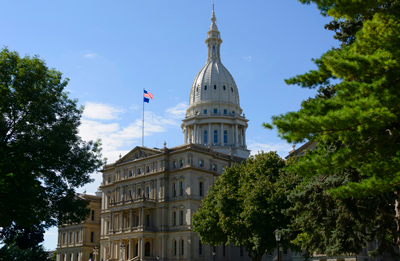
Gov. Gretchen Whitmer vetoed a bipartisan bill on Wednesday that would have provided tax relief to Michigan businesses hit hard by her COVID-19 shutdown orders.
She also vetoed a bill that would have allowed property owners in the Midland area affected by a massive flood in May, or the virus, to delay their summer taxes until 2021. According to the owners of Boyce Hydro, which operates four dams in the area, the flooding was compounded by orders by the state and Attorney General Dana Nessel to prevent the further drawdown of water in area lake levels.
“The Michigan AG’s office was threatening Boyce with a multi-million dollar lawsuit for the alleged death of freshwater mussels caused by the drawdown, and the AG’s office told Boyce it had to take efforts to mitigate the damages, i.e., raise the lake level,” Dan Curth, an attorney for the dam owners, told the Detroit Free Press.
In a letter to the legislature, Whitmer said the bills would “create more problems than they solve.” She also vetoed new measures to protect whistleblowers, which was approved unanimously by the House and Senate. Legislators signaled they had the votes to override the governor’s veto.
The Michigan Chamber of Commerce in Lansing said it was disappointed in Whitmer’s veto of business tax relief, stating her denial will hurt Michigan businesses and individuals. “The Governor had an opportunity to assist struggling businesses and individuals with much needed property tax relief but instead, decided to veto any support, leaving businesses and individuals without a lifeline,” chamber officials said.
“When state government comes in and forces businesses to shut down for over an entire calendar quarter, leaving them without revenue to pay one of the largest annual expenses they face (if not the largest), it would make sense to give an extension,” says Dan Papineau, director of tax policy and regulatory affairs at the Michigan Chamber.
“Giving businesses a short extension on paying their property taxes is a commonsense solution that will avoid further business closures and help our economy recover quicker. The bills had unanimous support in the House and overwhelming bipartisan support in the Senate.
“For individuals that have lost their job and fallen on hard times, and are likely unable to receive their unemployment benefits, they will have the same problems as businesses who have made little if any revenue. To deny taxpayers this needed relief without trying to work cooperatively on a solution is a missed opportunity. All the issues raised by the governor could have been resolved and denying taxpayers this relief could have been unquestionably avoided,” added Papineau.
Cash flow and liquidity are the biggest issues facing businesses as they reopen due to the mandatory shutdown during COVID-19, and HB 5761 and HB 5810 would have provided taxpayers a six-month, penalty and interest, free extension to make their property taxes.
After the six-month period a taxpayer can work with their county treasurer to enter an installment plan if more time to pay the summer levy is needed.
“Without this relief, the summer property tax bill could be the last nail in the coffin for several businesses,” said Papineau.
The Michigan Chamber is a statewide business organization that represents approximately 5,000 employers, trade associations and local chambers of commerce. The Chamber represents businesses of every size and type in all 83 counties of the state. It was established in 1959 to be an advocate for Michigan job providers in the legislative, political and legal process.





